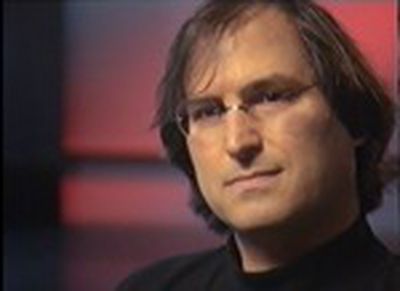 In 1995, before Steve Jobs returned to Apple, he sat down with Bob Cringely for an hour-long interview during the making of the Triumph of the Nerds TV series. Roughly 10 minutes of the interview was used in the show, but the rest of the historic interview was lost during shipping.
In 1995, before Steve Jobs returned to Apple, he sat down with Bob Cringely for an hour-long interview during the making of the Triumph of the Nerds TV series. Roughly 10 minutes of the interview was used in the show, but the rest of the historic interview was lost during shipping.
After Steve Jobs passed away in October, Triumph of the Nerds director Paul Sen decided to try and find a copy of interview, one Bob Cringely called "the best TV interview Steve Jobs ever gave". Sen found a VHS copy of the interview in his garage, and, after extensive restoration, the full-length interview is going to appear for a limited engagement in a number of theaters across the country.
Of all the reader suggestions for what I should do with my little film Steve Jobs — The Lost Interview, not one involved showing the movie in theaters. Yet that was the first thing that came to my mind. How old media-like of me and how new media-like of you. So we’re opening November 16th for a short run in about 20 U.S. theaters. These are mainly Landmark Theaters, but some others are now coming on and we’ve even had inquiries from Europe and Asia (keep them coming, please). The idea came to me late at night so I e-mailed Landmark owner Mark Cuban who replied in five minutes. proving insomnia has its virtues.
Cringely believes seeing a movie in a theater is a social experience, one that isn't "the same [as] watching on YouTube". He does hint that the show will eventually make its way online as well.
The movie will run on November 16th and 17th in most cities, with a longer run in Jobs' hometown of Palo Alto.






















Top Rated Comments
Cringely also believed he had a Ph.D until someone noticed he didn't (http://www.stanforddaily.com/2001/04/06/pbs-analyst-falsely-claims-stanford-phd/).
No one is being forced to attend, no taxes are funding the project, and presumably no animals were harmed during the filming. If someone's sensibilities are offended by paying to watch a video in a movie theater, he ought not buy a ticket.
Steve Jobs made billions for himself by selling things people wanted to buy. Sales of Michael Jackson's music in iTunes soared after his death, profiting Apple and ultimately Jobs, who presumably suffered no pangs of remorse for any disrespect of Jackson's memory. I understand that others have made money selling things people want, often without protest, and I doubt very many of them did so solely to improve the human condition. Why is this offering any different?
And why is it a mark of solemn respect for the memory of Steve Jobs to illegally pirate the intellectual property of others rather than to pay the rightful owner for it? Especially when Jobs himself came to abhor the infringement of intellectual property?
I've read Isaacson's book, watched the PBS documentary, and I've bought a ticket to see this interview. I'm a longtime devoted consumer of Apple products, and I find Jobs' personality and life story fascinating. Why shouldn't I go to a movie theater to watch the interview?
Saying that it's not as "social" as a movie theater is silly--you can't make comments about the film to your friends without angering those around you.